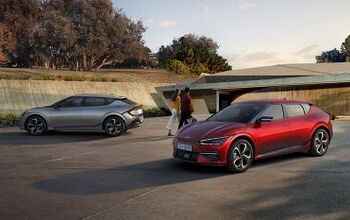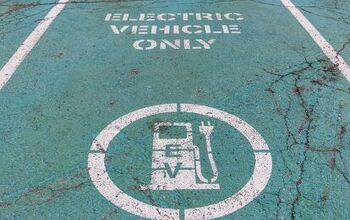Texas Considers Taxing Electric Vehicles

Texas lawmakers have presented Senate Bill 1728 as a way to nail electric vehicles for circumventing fuel taxes, sending everyone into a tizzy. Electrification has become about more than simply developing new powertrains under the auspices of environmentalism and it’s observable in this week’s headlines. But let’s discuss what SB 1728 hopes to achieve so that you might make up your own mind without this author’s forthcoming influence.
If passed, the bill would raise fees on EVs as a way to make up for the gas tax they’re not paying. The proposed legislation stipulates an annual fee of between $190 and $240, an additional fee of at least $150 for anyone who drives their car more than 9,000 miles a year, and then 10 bucks per year for the local charging advisory council. The rules would come into effect this September and raise an estimated $37.8 million for the State Highway Fund in 2022. While we cannot say whether that money will be used responsibly, the pretense is that the funds will be used to “[equalize funding for] road use consumption for alternatively fueled vehicles.”
Obviously, this resulted in several automotive groups and media outlets crying foul. CleanTechnica said it was effectively a punishment forcing “Tesla and EV owners” (what’s the distinction here?) to unfairly pay for infrastructure in the name of fairness. Meanwhile, Plug-in America (an EV advocacy group) saw its 2020 research cited as a way to suggest the fees associated with SB 1728 would be out of line with what the average light passenger vehicle pays annually. Of course, none of those gas-powered automobiles received colossal federal rebates — something Plug-in America believes is essential to improve adoption rates.
SB 1728 is sponsored by Republican Senators Charles Schwertner and Robert Nichols, and Democrat Beverly Powell. All of them have predictable ties to industries heavily reliant on petrochemicals. But it’s not like the Green Energy Lobby, which frequently masquerades as environmental advocacy groups, hasn’t been equally insidious of late.
The Tesla Owners Club of Austin has urged locals to contact their local representatives and demand that the bill be struck down, or at least be revised so that the fees are more in line with what it thinks gas-powered vehicles pay in fuel taxes.
Frankly, the latter response seems a fair compromise. But the surrounding discourse remains troubling. Many are claiming that EVs should be exempt from fees specifically because they offer almost miraculous benefits to society. Depending on the person you ask, swapping to electric vehicles will keep people out of hospitals for respiratory illnesses, restore the population of endangered animals, and make you a better person. Emitting greenhouse gasses has effectively become a sin, but only if it’s coming out of the back end of the car you’re driving.
It’s transforming into a moral issue for some and that’s really making it hard to have a serious discussion. My issue with EVs has always been that it costs more to buy one that’s functionally equivalent to an internal combustion vehicle (for now). But it’s silly to dictate what people should and shouldn’t drive when you’re purchase is ultimately going to result in massive levels of pollution regardless.
Would you rather have your car result in the dumping of heavy metals into the ocean, child labor violations, and nearby power plants handling all of your (hopefully lessened) emissions OR would you rather just spew a bunch of greenhouse gasses callously from your own tailpipe? The necessary components are going to be shipped around the globe on massive tanker ships (the number one contributor to air pollution in the world) either way.
Texas, and ultimately the nation, need to find a happy middle ground. Pretending that electric vehicles are going to be the answer to society’s ills doesn’t preclude them from needing to contribute toward supporting roadway infrastructure. But we shouldn’t be hitting them harder than their gasoline or diesel counterparts just because we associate them with the wealthy enjoying government subsidies. The real trick will be figuring out how to manage and balance things as EVs come more commonplace (cheaper). We’re just dreading the likely solution being something like giving the government direct access to your vehicle’s data so it can keep tabs on the odometer and charge you by mile.
We’ve probably got another decade or two before we absolutely must have sound regulatory solutions for electric cars. Let’s not muck it up because we’re in a rush or totally blinded by rhetoric employed by opposing industrial groups.
[Update 5/20/2021: Several people wanted to know what the average Texan pays in fuel taxes annually so I did some quick math. Occupants from the Yee-Haw State pay 38.4 cents in taxes for every gallon of gasoline they buy and 44.4 cents for every gallon for diesel. It’s one of the lowest fuel tax rates in the country (it’s an oil state) and works out to be about $140 per year if they’re driving 9,000 miles in driving a car that gets the national average of 24.9 mpg. Obviously, those with less efficient engines, running a diesel, or racking up more miles are paying extra.]
[Image: Leena Robinson/Shutterstock]

A staunch consumer advocate tracking industry trends and regulation. Before joining TTAC, Matt spent a decade working for marketing and research firms based in NYC. Clients included several of the world’s largest automakers, global tire brands, and aftermarket part suppliers. Dissatisfied with the corporate world and resentful of having to wear suits everyday, he pivoted to writing about cars. Since then, that man has become an ardent supporter of the right-to-repair movement, been interviewed on the auto industry by national radio broadcasts, driven more rental cars than anyone ever should, participated in amateur rallying events, and received the requisite minimum training as sanctioned by the SCCA. Handy with a wrench, Matt grew up surrounded by Detroit auto workers and managed to get a pizza delivery job before he was legally eligible. He later found himself driving box trucks through Manhattan, guaranteeing future sympathy for actual truckers. He continues to conduct research pertaining to the automotive sector as an independent contractor and has since moved back to his native Michigan, closer to where the cars are born. A contrarian, Matt claims to prefer understeer — stating that front and all-wheel drive vehicles cater best to his driving style.
More by Matt Posky
Latest Car Reviews
Read moreLatest Product Reviews
Read moreRecent Comments
- 1995 SC I will say that year 29 has been a little spendy on my car (Motor Mounts, Injectors and a Supercharger Service since it had to come off for the injectors, ABS Pump and the tool to cycle the valves to bleed the system, Front Calipers, rear pinion seal, transmission service with a new pan that has a drain, a gaggle of capacitors to fix the ride control module and a replacement amplifier for the stereo. Still needs an exhaust manifold gasket. The front end got serviced in year 28. On the plus side blank cassettes are increasingly easy to find so I have a solid collection of 90 minute playlists.
- MaintenanceCosts My own experiences with, well, maintenance costs:Chevy Bolt, ownership from new to 4.5 years, ~$400*Toyota Highlander Hybrid, ownership from 3.5 to 8 years, ~$2400BMW 335i Convertible, ownership from 11.5 to 13 years, ~$1200Acura Legend, ownership from 20 to 29 years, ~$11,500***Includes a new 12V battery and a set of wiper blades. In fairness, bigger bills for coolant and tire replacement are coming in year 5.**Includes replacement of all rubber parts, rebuild of entire suspension and steering system, and conversion of car to OEM 16" wheel set, among other things
- Jeff Tesla should not be allowed to call its system Full Self-Driving. Very dangerous and misleading.
- Slavuta America, the evil totalitarian police state
- Steve Biro I have news for everybody: I don't blame any of you for worrying about the "gummint" monitoring you... but you should be far more concerned about private industry doing the same thing.


































Comments
Join the conversation
Bravo Texas! Every state should assess a extra an extra fee on electric vehicles for use of public roads.
I don't see what the issue is here. Everybody keeps saying "tax the rich." Well, by my observations, most electric car buyers are pretty well healed yes? I'd be curious to see a study on this to confirm that but I'd bet you they make substantially more than the average income in the United States. So I guess I just don't understand what the complaint would be? Seems fair enough to me in light of the current mantra.